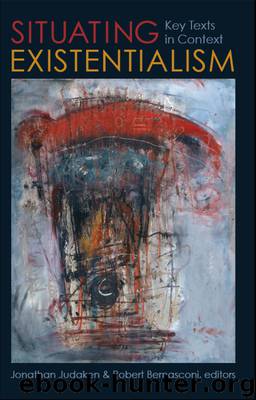Situating Existentialism by Judaken Jonathan; Bernasconi Robert;

Author:Judaken, Jonathan; Bernasconi, Robert;
Language: eng
Format: epub
Publisher: Columbia University Press
Published: 2012-03-12T16:00:00+00:00
8
Jewish Co-Existentialism
Being with the Other
Paul Mendes-Flohr
Alles wirkliche Leben ist Begegnung.
(All actual life is encounter.)
—Martin Buber, Ich und Du (I and Thou)
Martin Buber’s I and Thou
A distinctive Jewish school of existentialism is most widely associated with Martin Buber (1878–1965) and his philosophy of dialogue. Introduced in 1923 with the original German publication of I and Thou (Ich und Du), his concept of dialogue or the I–Thou relation has exercised a seminal influence extending far beyond Jewish philosophical circles. Written with a nigh-musical cadence, evocative inflections, and aphoristic formulations, this relatively thin volume has with some justification been characterized as a philosophical poem. Indeed, Buber explicitly rejected the traditional form of philosophical discourse. He regarded the function of philosophical thinking to be that of deixis, pointing, rather than apodeixis, demonstration. Accordingly, he viewed cognition to be primarily recognition and viewed discursive knowledge as but rational acknowledgment.1 He therefore resisted all attempts to classify his teaching, even as a species of existentialism. “I have no teaching. I only point to something. I point to reality, to point to something in reality that had not or had too little been seen. I take him who listens to me by the hand and lead him to the window. I open the window and point to what is outside. I have no teaching, but I carry on a conversation.”2
What he points to is a “truth” that all human beings experience—an experience so fundamental to everyday life that it often simply eludes the philosopher’s gaze.3 Buber refers to this experience as an I–Thou meeting or encounter. Unfortunately, the term Thou, which was employed in the first translation of Buber’s Ich und Du into English, obscures the everyday quality of the encounter he sought to highlight.4 The original German, Du, is the second-person singular pronoun used informally in ordinary speech; in contrast to the old English Thou, there is nothing sacerdotal, formal, or archaic about it. In contemporary German, the pronoun Du is differentiated from the formal second-person pronoun Sie; one would not use Du when addressing a stranger, a casual acquaintance, or individuals (such as a teacher or certainly a professor) with whom one has a formal relationship. Thus Du is reserved for the most familiar of relations—for example, between parents and their children, and among others with whom one is intimately bonded.
The emotional and indeed existential valence attached to the Du form of address is illustrated by the friendship between Buber and Franz Rosenzweig. By American standards they were good friends, yet they addressed one another as Sie. It was only after many years of close collaboration on various projects that Rosenzweig hesitantly asked Buber permission to address him as Du.5 (Not surprisingly, German has a verb to express this special linguistic act: duzen.) Upon receiving Buber’s confirmation that they had indeed reached the point in their relation in which they were “ready” to address one another as Du, Rosenzweig—now addressing Buber with the familiar pronoun—replied, “In my heart I will continue to say Sie.”6 In
Download
This site does not store any files on its server. We only index and link to content provided by other sites. Please contact the content providers to delete copyright contents if any and email us, we'll remove relevant links or contents immediately.
The Lost Art of Listening by Michael P. Nichols(7483)
Why I Am Not A Calvinist by Dr. Peter S. Ruckman(4135)
The Rosicrucians by Christopher McIntosh(3505)
Wicca: a guide for the solitary practitioner by Scott Cunningham(3158)
Signature in the Cell: DNA and the Evidence for Intelligent Design by Stephen C. Meyer(3121)
Real Sex by Lauren F. Winner(3001)
The Holy Spirit by Billy Graham(2935)
To Light a Sacred Flame by Silver RavenWolf(2804)
The End of Faith by Sam Harris(2724)
The Gnostic Gospels by Pagels Elaine(2515)
Waking Up by Sam Harris(2448)
Nine Parts of Desire by Geraldine Brooks(2355)
Jesus by Paul Johnson(2347)
Devil, The by Almond Philip C(2322)
The God delusion by Richard Dawkins(2295)
Heavens on Earth by Michael Shermer(2268)
Kundalini by Gopi Krishna(2171)
Chosen by God by R. C. Sproul(2151)
The Nature of Consciousness by Rupert Spira(2085)
